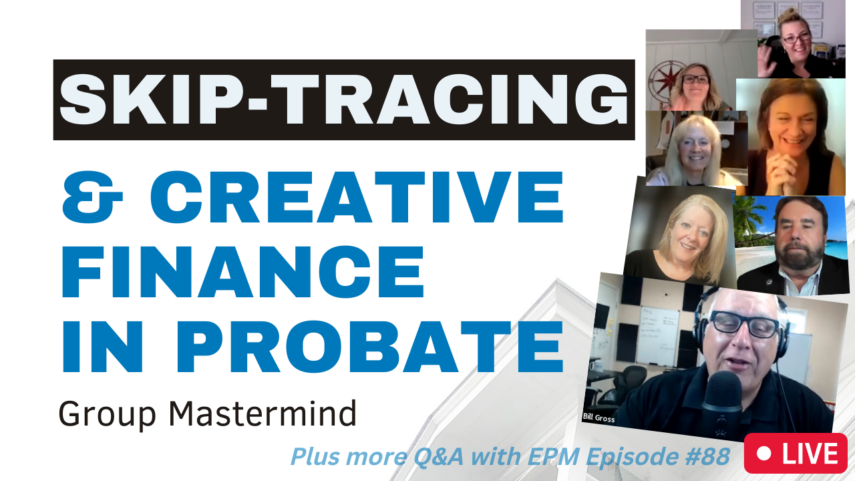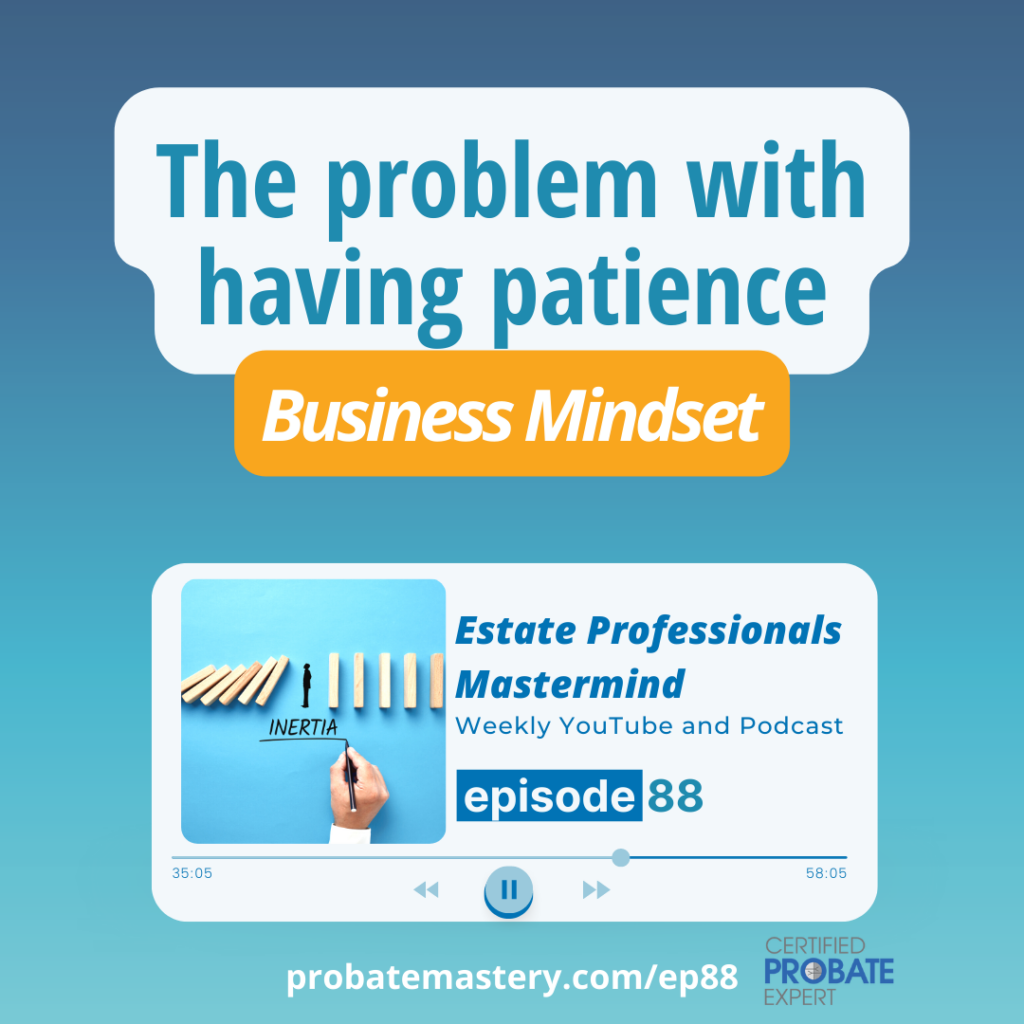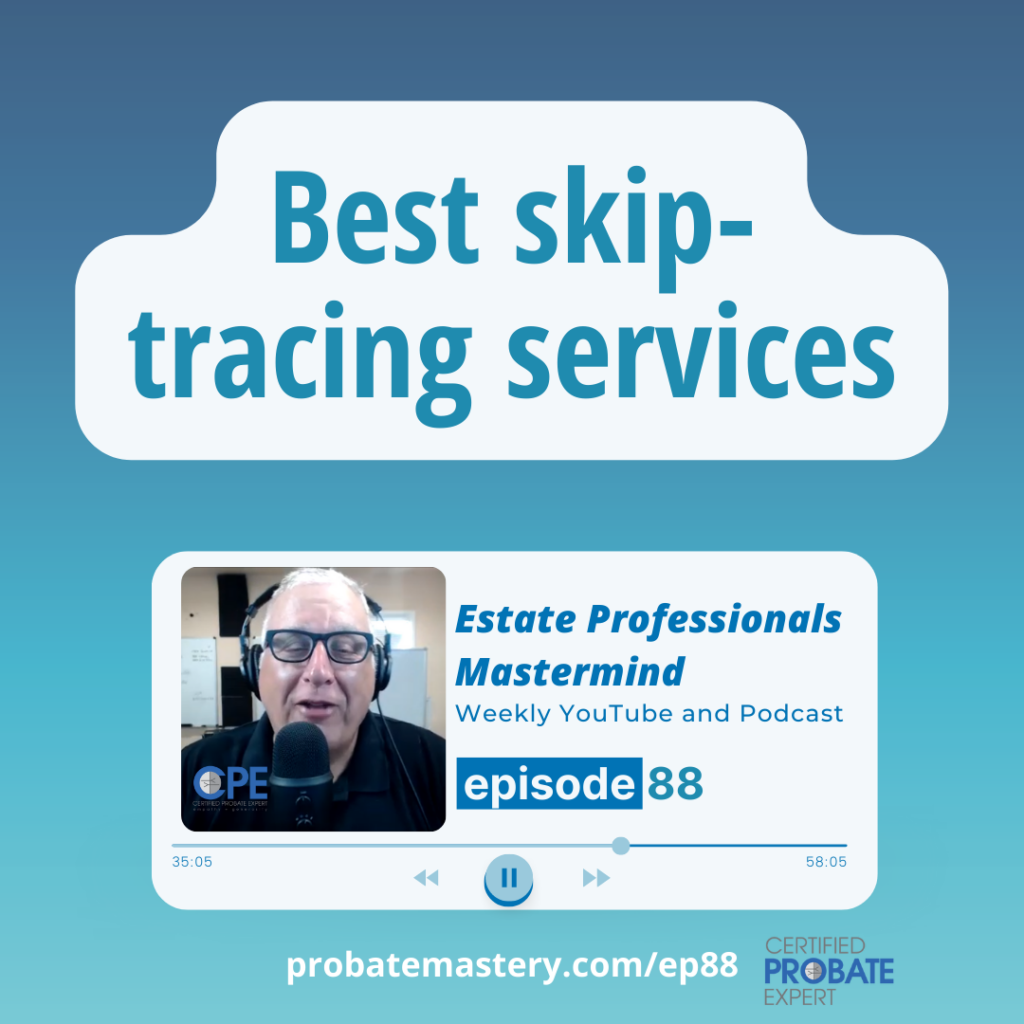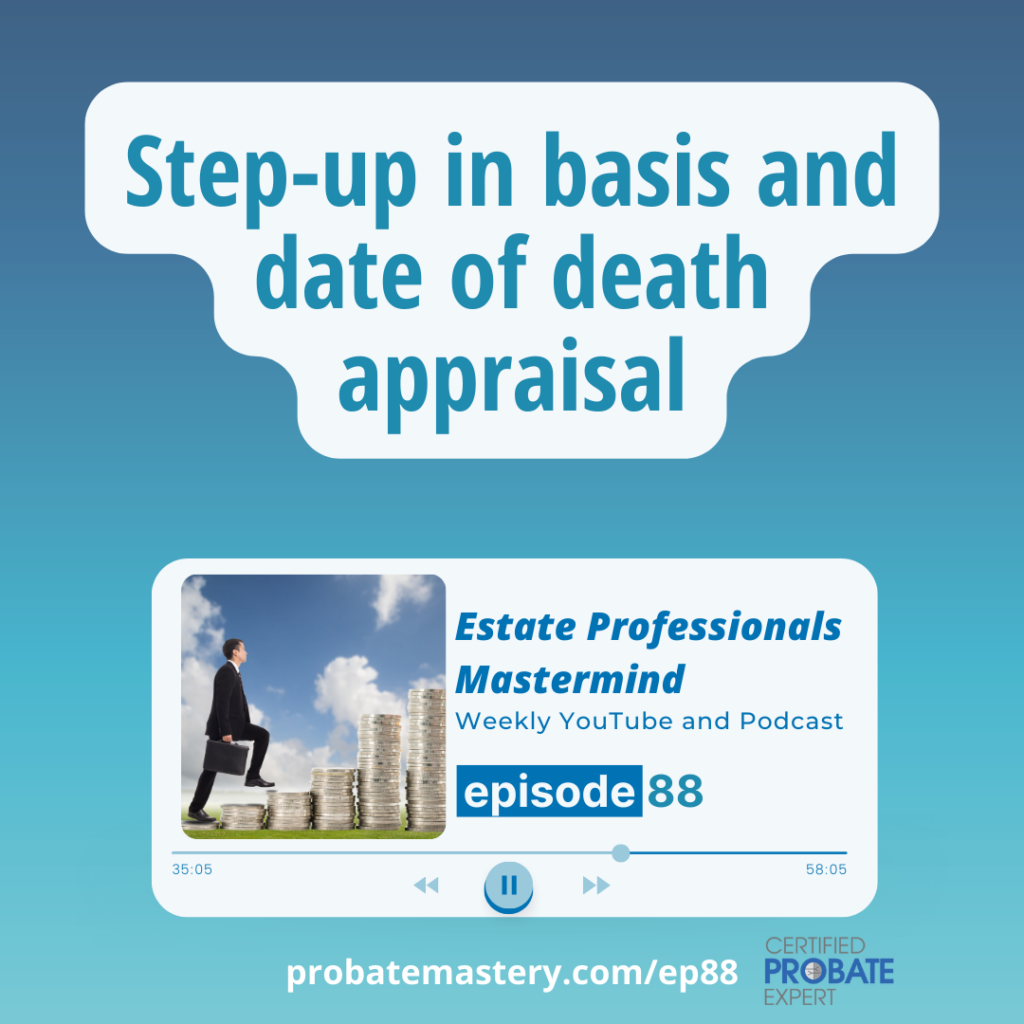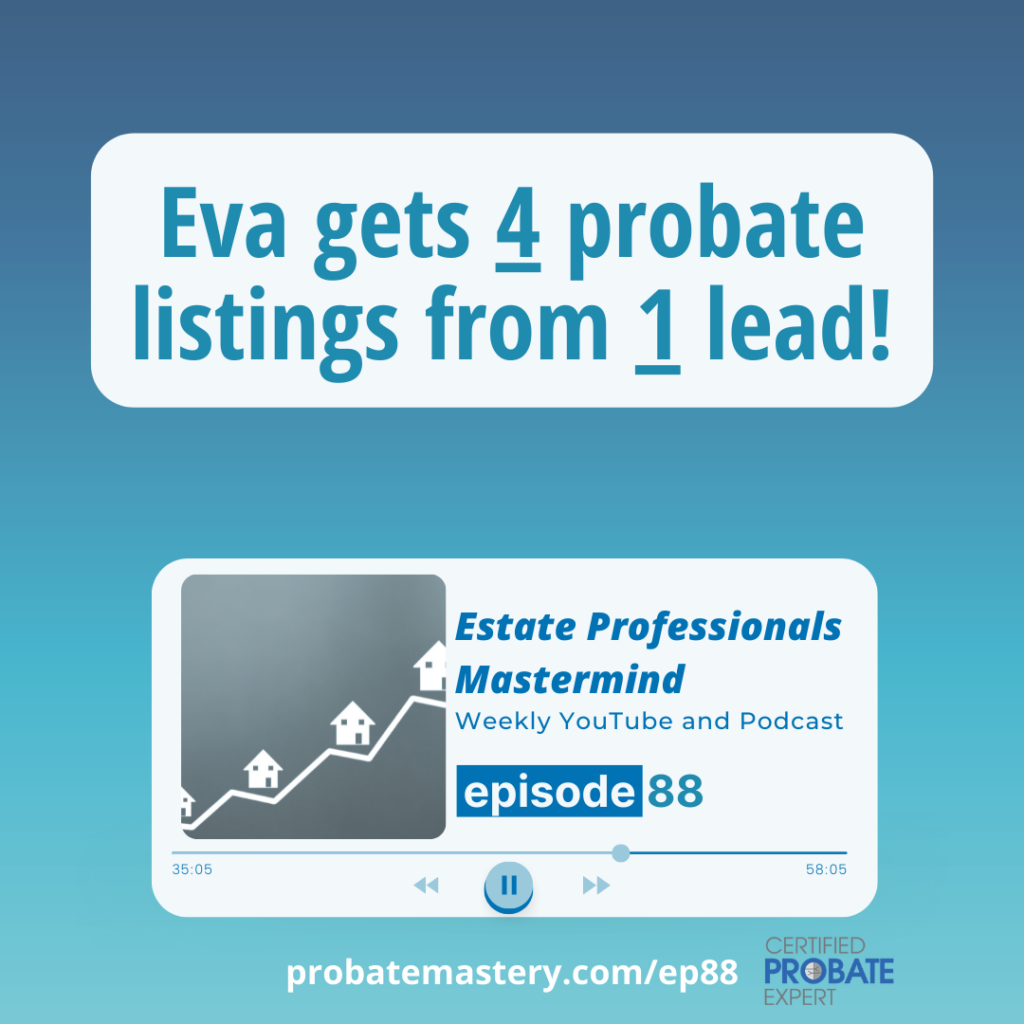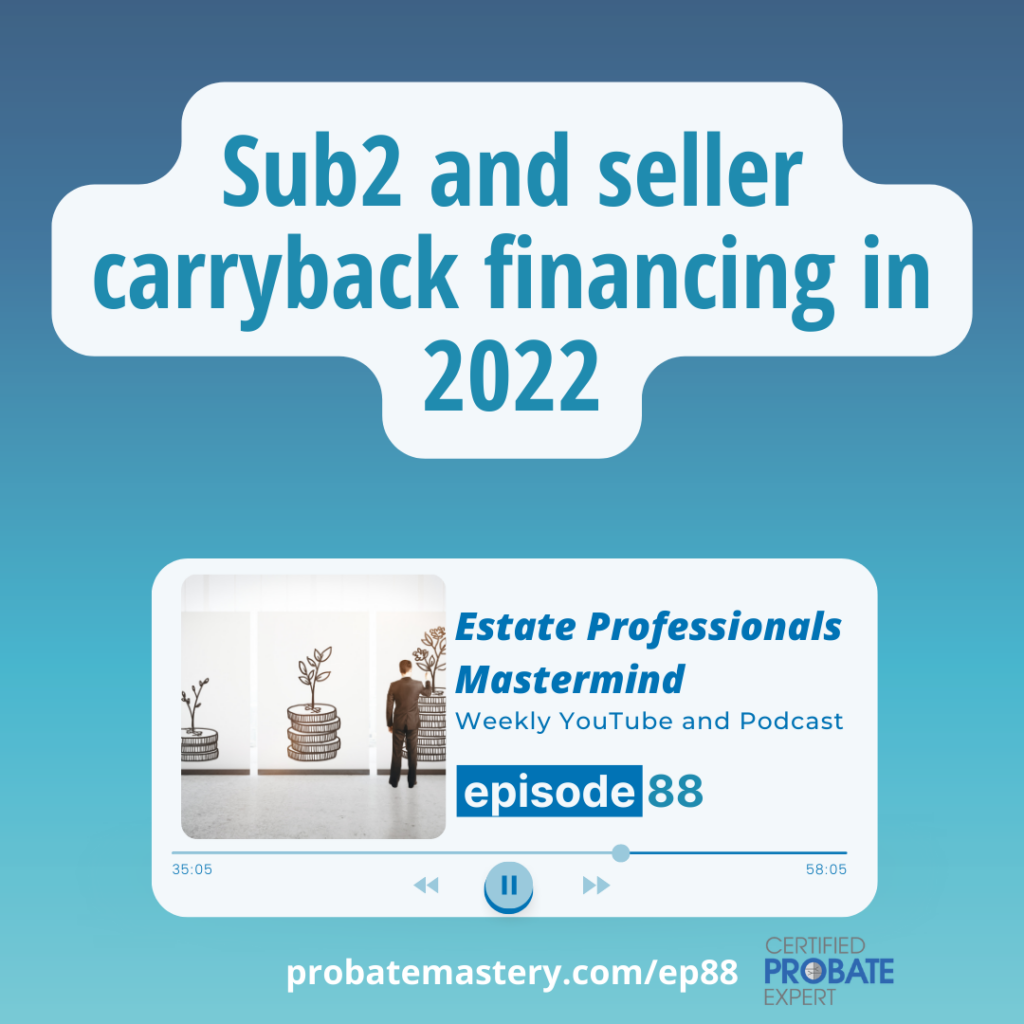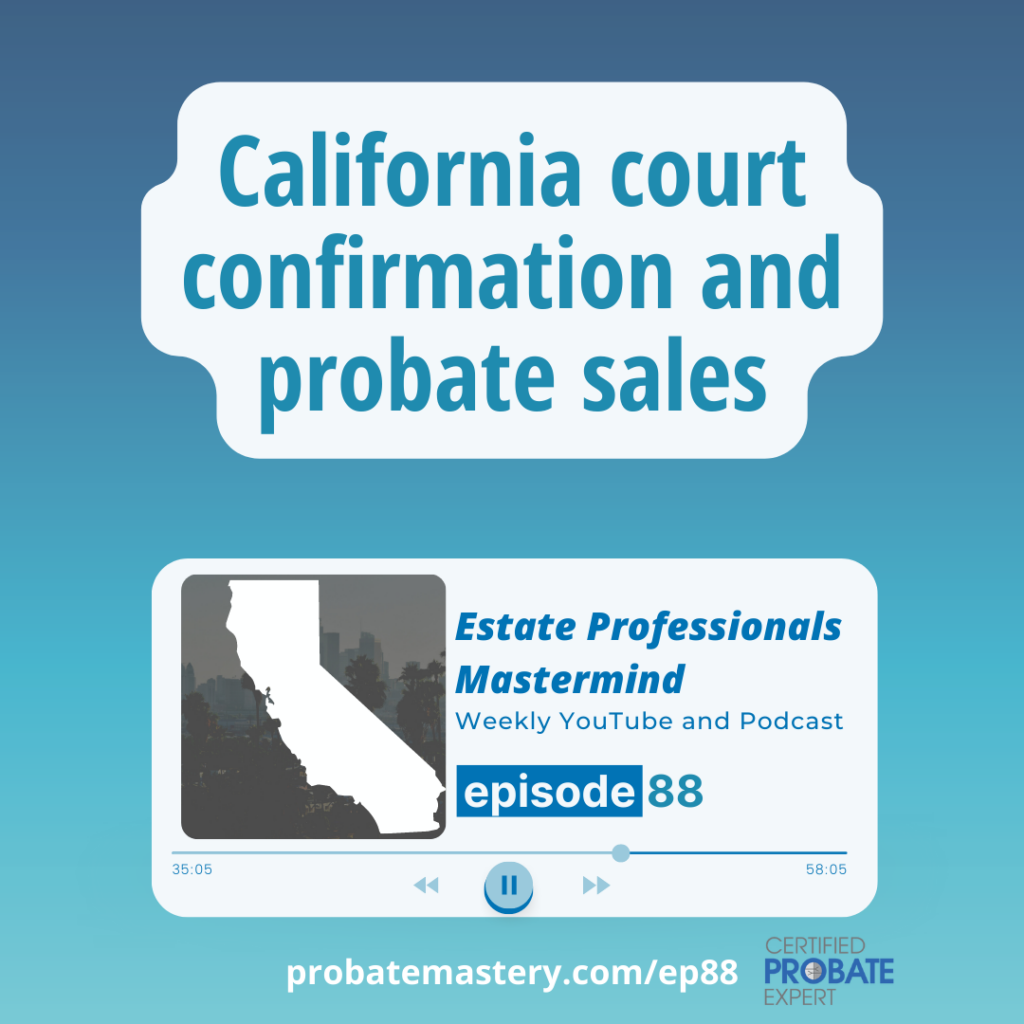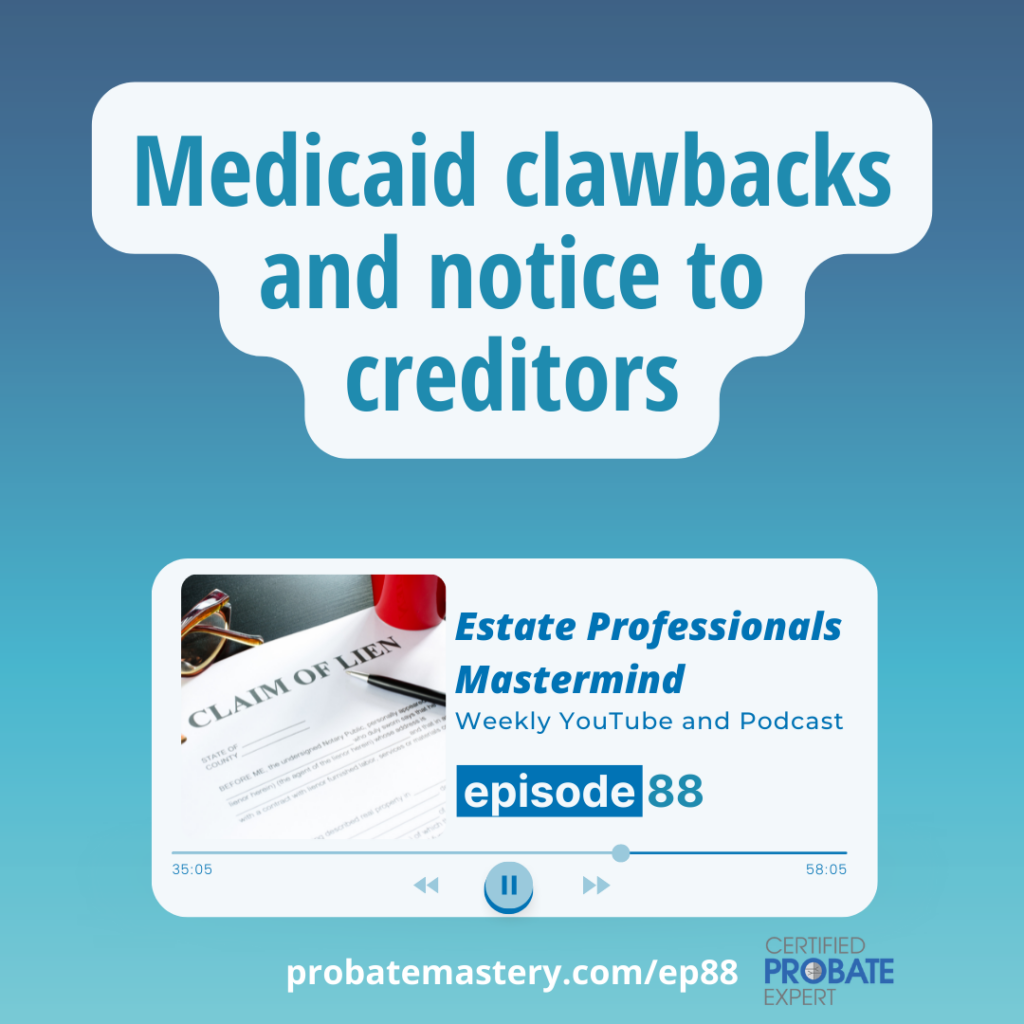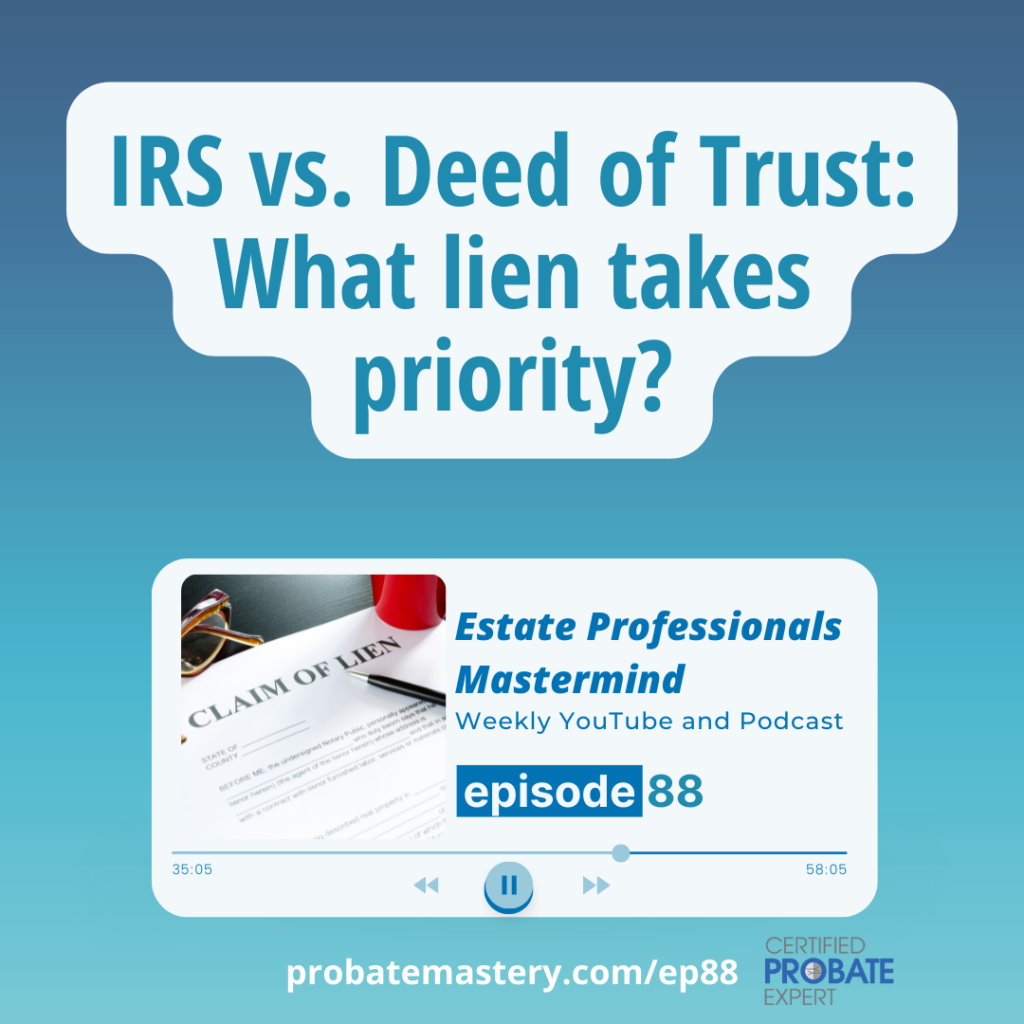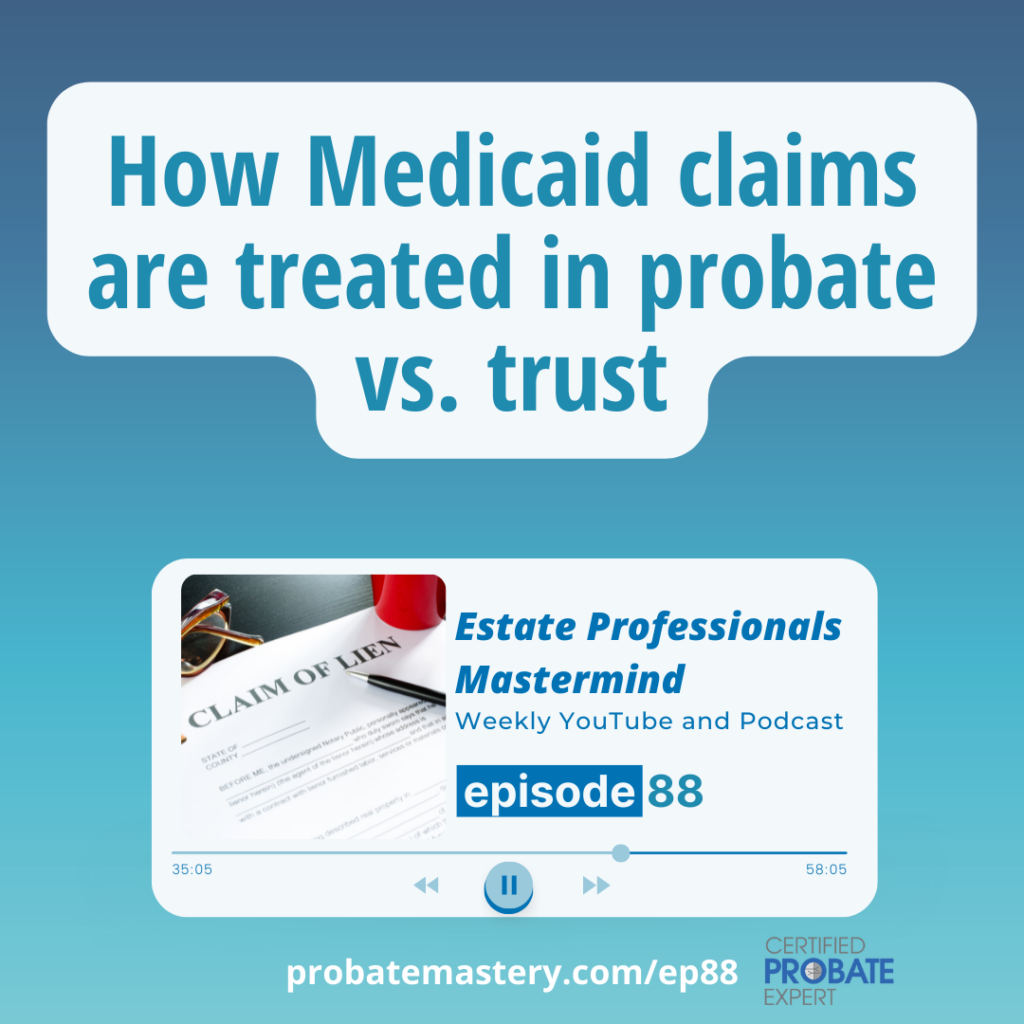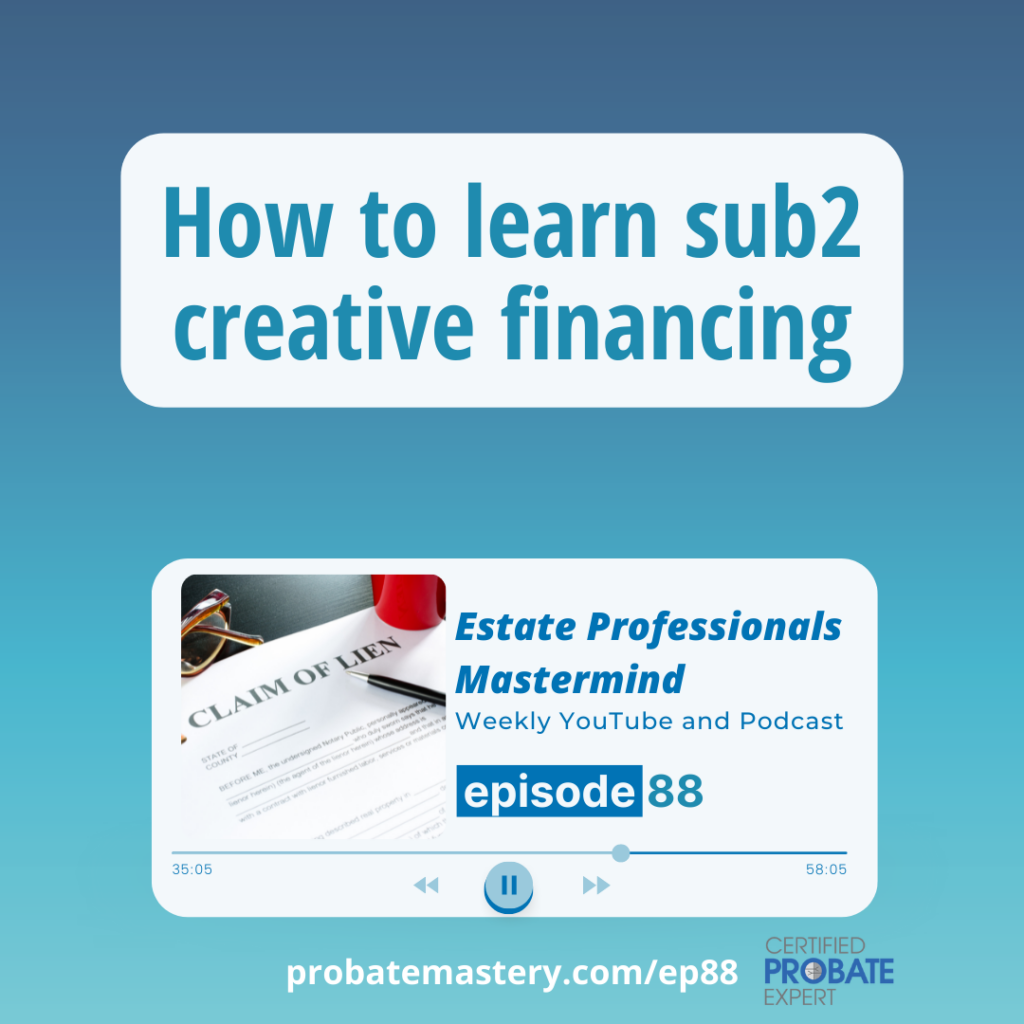In this episode and summary guide, we talk about seller carryback and sub2 creative financing in probate, Medicaid liens, and how step-up in basis works. We also hear a success story from Eva who took 4 probate listings from a single lead and suggestions from the group on what skip tracing companies they prefer to use.
Table of Contents:
- Podcast and Video Streams
- The problem with having patience (Business Mindset)
- Best skip-tracing services (Probate Data)
- Step-up in basis and date of death appraisal (Real Estate Tax)
- Eva gets 4 probate listings from one lead (Probate Success Stories)
- Sub2 and seller carryback financing in 2022 (Creative Finance)
- California court confirmation and probate sales (California Probate)
- Medicaid clawbacks and notice to creditors (Medicaid Liens)
- What liens and claims have priority stakes? IRS vs. Deed of Trust (Real Estate Liens)
- How Medicaid claims are treated in probate vs. trust (Medicaid and Probate)
- How to learn sub2 creative financing (Sub2 Videos)
- EPISODE RESOURCES
Podcast and Video Streams for Carryback and sub2 creative financing in probate: Weekly Probate Expert Mastermind Episode #88
The problem with having patience (Business Mindset)
Patience is a virtue, but in the world of real estate, it can often lead to inaction. When you’re dealing with clients, properties, paperwork and deadlines, it’s easy to let things slide and procrastinate. However, this can often lead to missed opportunities and costly mistakes.
It’s important to be patient in real estate, but you also need to be proactive. Keep your eye on the prize and don’t let anything get in the way of your success. Time is money in this business, so make sure you’re always moving forward. Bill Gross gives great insight in this segment.
Best skip-tracing services for probate leads (Probate Data)
Skip-tracing is the process of finding a person’s current contact information. It is most often used by detectives, bail bondsmen, and debt collectors, but can also be useful for real estate investors and agents that are looking for property owners.
There are a number of ways to skip-trace a lead. The most common is to use a public records search. This can be done online or in person at your local courthouse. You can also use private databases, which are not available to the general public but can be purchased by businesses.
Another way to skip-trace a lead is to use social media. If you know the person’s name and location, you can try searching for them on Facebook, Twitter, or LinkedIn. You may also be able to find them through a Google search.
Finally, you can hire a skip-tracing service. These companies specialize in finding people, and they will often have access to databases that you do not. However, they can be quite expensive.
Some of the best skip-tracing companies suggested in the live chat of this call are Propstream, BatchSkipTracing, FastPeoplefinder, and Spokeo.
Once you have found the person’s current contact information, you can then begin to try to contact them.
Step-up in basis and date of death appraisal (Real Estate Tax)
The step-up in basis and date of death appraisal is a method used to determine the value of the real estate for tax purposes. When an owner dies, the fair market value of the property is generally used to calculate the value of the estate. However, if the property was held for investment or personal use, the stepped-up basis may be used instead. This allows the heirs to avoid paying capital gains tax on the appreciation of the property.
To qualify for the stepped-up basis, the property must have been owned by the decedent for at least one year prior to their death. Additionally, the appraised value must be greater than the original purchase price plus any improvements made to the property. If these requirements are met, the heirs can use the appraised value of the property as the new basis for computing capital gains tax.
The step-up in basis and date of death appraisal can be a valuable tool for reducing the tax burden on an estate. However, it is important to consult with a qualified tax advisor that knows your local and state tax laws regarding estate tax. Watch this segment to hear more.
Eva gets 4 probate listings from one lead (Probate Deals)
One probate deal can often lead to many more deals in real estate. This is especially true when a decedent owns multiple properties. By understanding probate law and the process of probate, investors can often find great deals on properties, and agents can find multiple listing opportunities.
Though Eva was working with a seller she found as a mobile home lead, it happened to be in probate. The decedent also owned 3 additional properties. Eva also helped the sale of one of the properties move forward by using seller financing. This segment demonstrates the power of having the knowledge and skillset to uncover opportunities in any conversation.
Seller carryback and sub2 real estate deals in 2022 (Creative Finance)
Sub2 and seller carryback financing are two common types of financing used in the purchase of real estate. Sub2 financing is where the buyer assumes the existing mortgage and the seller deeds the property to the buyer. This type of financing is often used when a buyer does not have the full amount of the purchase price available, but knows there is profit potential in the equity of the property.
Seller carryback financing is when the seller agrees to finance part or all of the purchase price of the property for the buyer. This type of financing is often used when the buyer does not have good credit or cannot obtain a loan from a traditional lender. Seller carryback can also be called Owner Will Carry (OWC), owner financing, and seller financing.
See More: Free Guide to Probate for Investors
In this segment, Bill Gross describes why the current housing marketing is a great opportunity for carryback financing and sub2 deals.
California court confirmation and probate sales (California Probate)
When it comes to probate real estate best practices, one of the most important things to keep in mind is California court confirmation and authority for probate sales.
When a court grants an executor full authority to sell property in a probate sale, this means that the executor does not need to obtain court approval for the sale beforehand. The executor simply needs to follow the procedures set forth in the Probate Code.
However, if the court grants the executor limited authority to sell property in a probate sale, this means that the executor must obtain court approval for the sale before proceeding.
Court confirmation is the legal process whereby a judge reviews and approves the sale of real property that is part of an estate.
Probate sales are governed by California Probate Code section 10300-10316. This section of the code sets forth the requirements for Notice of Proposed Action, which must be sent to all interested parties at least 30 days prior to the proposed sale date.
The Notice must contain information about the property to be sold, the terms of the sale, and how interested parties can object to the sale.
In order for a probate sale to be confirmed, the court must find that the sale is necessary, that it is in the best interests of the estate, and that the terms of the sale are fair and reasonable.
Medicaid claw-backs and notice to creditors (Medicaid Liens)
When a person dies, their estate may be subject to Medicaid clawbacks. This means that the state can recoup any Medicaid benefits paid out during the person’s life. In addition, creditors may also make claims against the estate. As a result, it is important to notify creditors of the death and give them an opportunity to file a claim. This can be done by publishing a notice in a local newspaper. The probate court can also provide a list of creditors to be notified.
In this segment, Bill and Lynette discuss some of the complications involved with creditor claims and Medicaid liens.
What liens and claims have priority stakes? IRS vs. Deed of Trust (Real Estate Liens)
There are a few different types of priority claims that can be made on a property, but the two most common are IRS liens and Deed of Trusts. An IRS lien is a claim that the government has on a property in order to satisfy unpaid taxes. A Deed of Trust is a claim that a lender has on a property in order to secure repayment of a loan.
IRS liens have priority over Deed of Trusts, which means that if there is an outstanding IRS lien on a property, the lender’s claim will be subordinate to the IRS lien. This means that if the property is sold, the proceeds from the sale will first go towards satisfying the outstanding IRS lien, and only then will the lender be repaid.
There are a few ways to avoid this scenario, including paying off the outstanding taxes owed or negotiating with the IRS to release their lien. However, if neither of these options is possible, it’s important to be aware that the Deed of Trust will take second priority to the IRS lien.
In this segment, Bill and Lynette discuss how to work with a CPA and the correct agencies to figure out what liens take priority when dealing with estate debts.
How Medicaid claims are treated in probate vs. trust (Medicaid and Probate)
When it comes to real estate and Medicaid, there are a few key things to know. One is how probate vs. trust claims are treated. Here’s a quick rundown:
If a property is owned outright by the Medicaid recipient, it will generally go through probate upon their death. However, if the property is held in trust, the trust can often avoid probate altogether.
For more information on all things related to real estate and Medicaid planning, be sure to speak with a qualified attorney.
How to learn sub2 real estate for creative financing
The best place to learn about sub2 creative financing is from a real estate professional who has done sub2 deals before. There are many different ways to finance a real estate transaction, and a professional can help you understand when sub2 is the best option for a situation.
Another great way to learn about sub2 creative financing is by reading books or watching videos on the subject. There are many different resources available that can help you learn more about this type of financing.
See More: Jump to our probate investing & wholesaling YouTube playlist.
You can also attend seminars or webinars that discuss sub2 creative financing. These events can be a great way to learn more about this type of financing and to network with other professionals.
Another option is to join a real estate investing group. These groups often have members who are experienced in sub2 creative financing and can offer advice and support. In our Facebook Group, we have several experienced investors who have done sub2 deals with probates, preforeclosures, and slowflip properties. Jump in and ask for help!
Finally, you can always contact a professional such as a mortgage broker or loan officer to learn more about sub2 creative financing. These experts can help you understand the process and find the best financing option for your needs.
In this segment, the group shares a few of their favorite places to learn Sub2.
Resources for Episode 88
Please note that live participation in weekly group coaching is reserved for Certified Probate Experts (Probate Mastery course alumni).
- FREE TRAINING: Probate Fast Track
- Take Chad’s Probate Course and get Certified in Probate Real Estate
- Sign up for EARN – The Earn Attorney Referrals Now course.
- Facebook Group: Estate Professionals Mastermind Group
- Probate Mastery Alumni Group (For students of the Probate Mastery Course): Probate Mastery Alumni Group
- Probate and Pre-Probate list providers
- Try Propstream Free
- Book a marketing strategy consultation with Katt
- Book a coaching session with Bill Gross
Recent content:
How to get probate leads from the courthouse (Episode 85)
The 48-Hour Real Estate Referral Formula (Episode 86 – Success Story)
How to get more referrals in real estate, WITHOUT Direct Mail (Episode 87 – Success Story)
EstateExec Guide, Reviews, and Interview with Dan Stickel (Episode 84)
Links for this episode:
Bill Gross’s Probate Cash Advance Mastermind Program: www.GetProbate.Cash
Conclusion:
We covered why seller carryback and sub2 deals are a HUGE opportunity right now, why understanding step-up in basis and real estate liens is important, and how no single lead is a dead end. We do these coaching sessions each week with Certified Probate Experts. You can participate live and get access to the mastermind where we share tips and resources when you become a Probate Mastery member.

